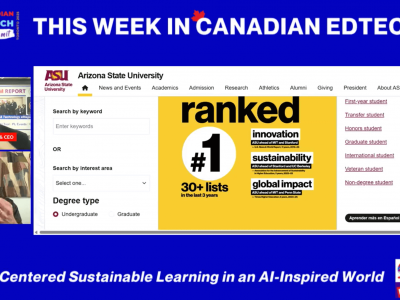From the Globe & Mail
 As a university president, David Johnston always felt grateful to see the words “innovation,” “entrepreneurship,” “creativity” and “productivity” repeated often in the federal government’s Speech from the Throne. Now that he’s Canada’s Governor General, and even with an austerity budget looming two weeks from now, he’s hopeful he’ll be reading them himself.
As a university president, David Johnston always felt grateful to see the words “innovation,” “entrepreneurship,” “creativity” and “productivity” repeated often in the federal government’s Speech from the Throne. Now that he’s Canada’s Governor General, and even with an austerity budget looming two weeks from now, he’s hopeful he’ll be reading them himself.
Mr. Johnston and his wife, Sharon, spent Wednesday touring Toronto-based organizations fostering education through technology and the arts, including Ryerson University’s expanding Digital Media Zone incubator, and Spongelab Interactive, a maker of online game-based learning tools.
With Canada still lagging other countries on innovation and productivity measures, he was excited to test out examples of the kind of technological and social innovation he wants encouraged, nourished and multiplied. These ideas – from contraptions shaping the way computers can respond to human gestures, to games that cast historical study as a mission to unearth clues and break codes – should create “great expectations,” Mr. Johnston said.
“[What Canada needs is] a culture … of innovation where people are encouraged to stretch beyond their limits and the limits of existing science and existing social organizations,” Mr. Johnston said in an interview with The Globe and Mail. “You pull the good ideas out of people.”
The Governor-General professes to have no idea what the federal government has in store in its next budget, but stressed that a deep innovation culture is a shared responsibility of all levels of government and local school boards, not to mention private industry, where commitment to research and development “is not as strong as it should be.”
“Our biggest lacking feature in Canada is the receptor capacity of Canadian industry for good ideas,” he said.
Even in Kitchener-Waterloo, Canada’s most obvious example of a successful innovation cluster, the region’s poster child, Research In Motion, has been floundering. But Mr. Johnston, a former president of the neighbouring University of Waterloo, seems sanguine about the tech corridor’s fortunes, saying a much broader ecosystem of talent has bloomed, both drawing from and contributing to RIM’s fortunes.







